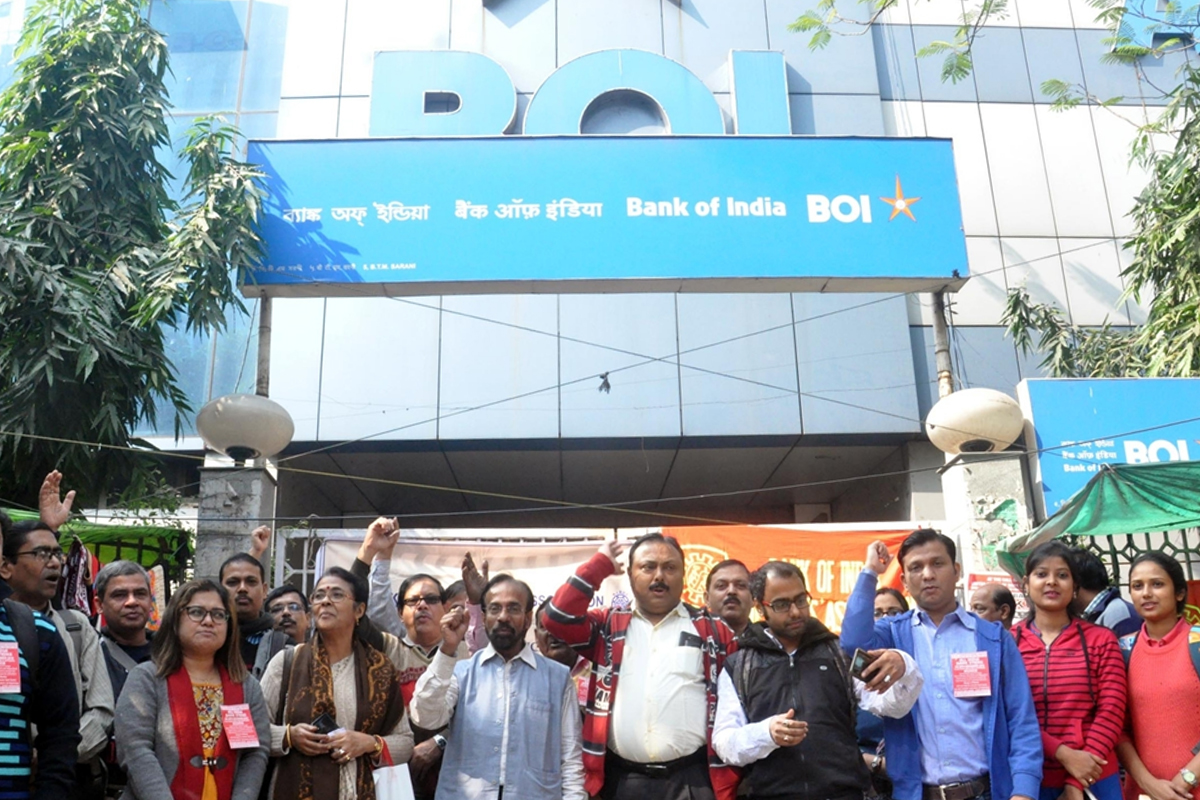Bank strike: Will your branch be open on March 24-25? Check here!
For clients who depend on face-to-face banking, it's best to schedule transactions in advance to stay away from inconvenience amid strike and regional holidays.
Fifty-two years after the nationalisation of banks, the contentious issue is privatisation of two banks, as proposed in the Budget 21-22, that was presented in the Lok Sabha on February 1 by finance minister Nirmala Sitharaman.
Statesman News Service | New Delhi | February 12, 2021 11:59 am

General Strike on January 8. (Photo: IANS)
Banks and banking will be in suspended animation on March 15 and 16 in response to a two-day strike called by the United Forum of Bank Unions, an umbrella entity of nine unions.
Fifty-two years after the nationalisation of banks, the contentious issue is privatisation of two banks, as proposed in the Budget 21-22, that was presented in the Lok Sabha on February 1 by finance minister Nirmala Sitharaman.
Advertisement
The proposed agitprop, announced on Tuesday, February 9, does suggest that it took the bank unions barely nine days to firm up the praxis of total dislocation of banking throughout the country a month from now, and without a scintilla of discussions with the finance ministry.
Advertisement
More basically, the strike will turn out to be a four-day stoppage of banking. Indeed the prefixsuffix syndrome appears to have been studiously calibrated. Prior to the start of the strike, March 13 is a second Saturday and, therefore, a bank holiday.
March 14 is a Sunday, a mandatory closure. The deleterious impact of the agitprop will be felt most acutely in West Bengal, which traditionally has been no stranger to strikes, regardless of the issues and the political backing. To summon a variant of historian Athar Ali’s seminal work on Mughal India, parties and politics have been in the banking court for as long as they have.
This time, as invariably on every occasion, the bank unions have garnered the support of the political class ~ save perhaps the BJP ~ to lend support to the agitation. To call the dislocation on 15th and 16th March a two-day strike is a misnomer, if ever there was one.
The fiscal dislocation will be considerable in the season of the Union budget, state budgets and the Vote-on-Account in states that will be going to polls very shortly. To that can be added the fiscal transactions that are imperative for every State to purchase the Covid vaccine, not to forget the inconvenience that will be caused at the individual level, with cheques piling high in the absence of clearing operations.
There is time yet before the shutters are brought down across the country. The employees may have their problems with the proposed privatisation; but these could well have been sorted out through negotiations.
The mergers of no fewer than four banks last year has been generally accepted. Stoppage of work is scarcely a solution. The jhanda-wielding bank unions in Bengal must be laughing up their sleeves over the dubious prospect of a four-day break from normal service.
Advertisement
For clients who depend on face-to-face banking, it's best to schedule transactions in advance to stay away from inconvenience amid strike and regional holidays.
Indian banks' net interest margins (NIMs) will likely decline by 10 basis points on average in 2025-26, Fitch Ratings said in a report.
While the Indian financial sector shows resilience, international market conditions may have some influence on India. Any correction in the US stock market could have implications for global markets, it warned.
Advertisement
